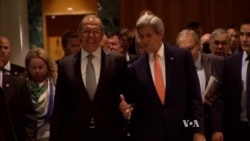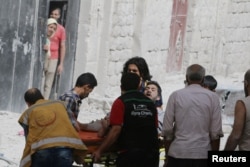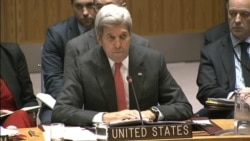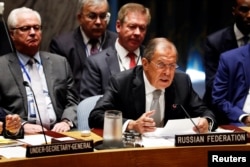Air raids hit several rebel-held areas of Aleppo overnight Wednesday, marking the heaviest strikes the city has seen in months, just hours after U.S. Secretary of State John Kerry called for an end to warplanes flying over “key areas” of Syria.
Opposition activists immediately pointed the finger at Syrian government, though officials have yet to comment on the reports. Heavy fighting flared up along the outskirts of Aleppo Thursday morning following the air strikes.
Air raids in East Aleppo earlier Wednesday killed 12 civilians and presented a major challenge to the cease-fire brokered between the United States and Russia earlier this month.
If the deteriorating cease-fire in Syria is to be salvaged, U.S. Secretary of State John Kerry said Wednesday, warplanes must stop flying over "key areas" of the country, including places where humanitarian agencies are trying to deliver food and medicine.
After flagrant violations of the Syrian cease-fire agreement forged earlier this month by the United States and Russia — in particular, the deadly airstrike that destroyed an aid convoy Monday, which the U.S. has blamed on Russia — Kerry said all sides in the conflict are at "a moment of truth."
The top American diplomat's proposal was worded diplomatically, not singling out Russian or Syrian planes, which have been blamed for most of the deadly attacks on civilian areas during the past year of war. Kerry said it would apply to all aircraft in specified areas of Syria, including planes flown by the United States and its coalition partners.
Kerry made his appeal to a high-level meeting of the U.N. Security Council, saying a limit on flights is crucial to reining in the bloodshed in Syria.
"We must move forward to try to immediately ground all aircraft flying in those key areas in order to de-escalate the situation and give a chance for humanitarian assistance to flow unimpeded," Kerry said. "And if that happens, there is a chance of giving credibility back to this process."
Russians dismissive
Russian Foreign Minister Sergei Lavrov, who had addressed the Security Council before Kerry, did not immediately respond to the American proposal, although his spokeswoman said later the U.S. was proposing "nothing ... a show."
WATCH: Kerry slams Russia for not adhering to cease-fire pre-conditions
Kerry said his aim is to "prevent Syria from doing what it has done so often in the past, which is to attack civilian targets with the excuse that it is just going after" terrorists and extremists.
Nusra and the so-called Islamic State are the two terrorist groups excluded from the truce in Syria, and the U.S. and Russia are supposed to be cooperating with one another to defeat them.
Kerry said he wanted to emphasize to Russia that Washington still supports finding a diplomatic solution. "The United States continues to believe there is a way forward that, although rocky, difficult and uncertain, can provide the most viable path out of the carnage," he said.
'Even more suffering' possible
A spokesman for the main Syrian opposition group, the High Negotiations Committee, welcomed Kerry's proposal “for the grounding of Syrian air forces, which are the leading killers of Syrian civilians." But the spokesman, Bassma Kodmani, said the group was deeply skeptical of "agreements with Russia, which has shown a consistent willingness to violate deals and to flagrantly violate international law."
Kerry said those who believe the crisis in Syria cannot get any worse are "dead wrong," and that while the current cease-fire plan is imperfect, there has not been any "remotely realistic" alternative.
"If we decide not to do what it takes to make this work, this cessation of hostilities," Kerry said, "then make no mistake, my friends, the next time we convene here, we are going to be facing a Middle East with even more refugees, with more dead, with more displaced, with more extremists, with more suffering on a greater scale. That is a certainty."
Russia's 'parallel universe'
The U.S. envoy also took aim at his Russian counterpart, Sergei Lavrov, who criticized the United States during his remarks to the Security Council. Kerry said he sometimes feels that Lavrov is in a "parallel universe" when it comes to the facts on the ground in Syria.
While the United States admitted within hours Saturday that it had accidentally hit Syrian military personnel, killing and injuring dozens, Russia has changed its story repeatedly about an attack Monday on an aid convoy that resulted in 20 deaths, eventually suggesting the cargo trucks carrying 100 tons of aid had simply caught fire. Witnesses said the aid convoy was hit by about 20 missiles, and photographs showed the burned wreckage was punctured by hundreds of large-caliber bullets, likely fired by either warplanes or helicopters.
"The trucks, and the food, and the medicine, just spontaneously combusted?" Kerry said in anger and disbelief. "This is not a joke; we are in serious business here." He challenged the Russians to be as truthful as the U.S. was when it admitted its role in Saturday's airstrike.
After the Security Council meeting, British Foreign Secretary Boris Johnson told reporters there were "only two forces capable of having carried out that strike [against the aid convoy], flying in that area. They are the Syrians and the Russians, and we have our doubts about the Syrian capability to fly at night. So you are left with a pretty strong conclusion."
U.N. Secretary-General Ban Ki-moon also spoke at Wednesday's Security Council meeting, emphasizing the world is at a "make-or-break moment" in Syria.
"We must remain determined that the cease-fire will be revived," he said, noting that "well over 300,000 Syrians" have been killed in the nearly six-year-long conflict.








